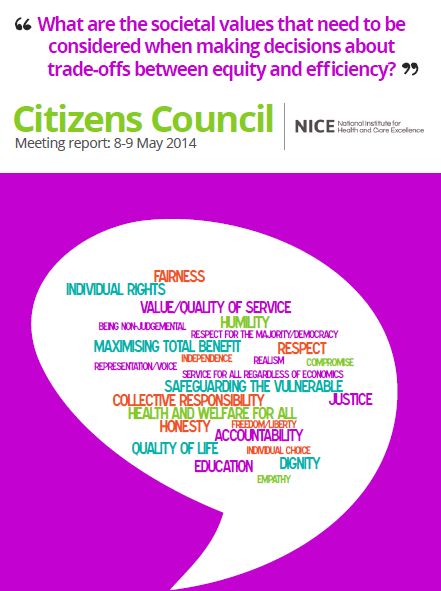04 December 2014
NICE group publishes final report on which values influence decisions on how health and social care resources are shared out
The Citizens Council, which advises NICE, has published its final report on which societal values should influence NICE’s decisions about getting the best value from the money spent (efficiency) whilst ensuring those resources are shared fairly (equity).
The Citizens Council – a group of 30 members of the general public – considered the societal values which influence decisions on how health and social care resources are allocated. The Council concluded that there are a number of values based on fairness across the board, that apply across public health, health, and social care when making decisions on equity and efficiency. These include a right to health and welfare for all, collective responsibility, dignity, value, honesty, and humanity.

They also decided that there are some additional values that were particular priorities for each of the three areas of care, including:
- public health: individual rights; maximising total benefit; safeguarding the vulnerable
- social care: right to health and welfare for all; independence; individual choice
- healthcare: justice; respect; being non-judgmental.
The council also highlighted that a special circumstance where greater emphasis on equity is needed is public health intervention in times of epidemic or natural disaster. They felt that a special circumstance where a greater emphasis on efficiency is needed is non-essential cosmetic surgery.
The Council’s view provides public input into the Institute’s work and will inform the work of NICE's independent advisory committees.
Professor David Haslam CBE, Chairman of NICE, said: “I very much welcome this final report from the Citizens Council on the societal values which inform their views on balancing equity with efficiency. Following a period of public comment, the Council submitted its report to the Board of NICE in November. This final report sets out the Council’s conclusions on the societal values which underpin getting the most out of every pound spent (efficiency) against ensuring that there is fairness in the way resources are spent (equity).
“The Council’s view that values based on fairness, including collective responsibility, a right to health and welfare for all, dignity, and humanity are some of the core societal values which apply across NICE’s three main areas of care, will help inform our work integrating the development of our health, public health, and social care guidance and standards. Their conclusions will also inform NICE’s update to the Social Value Judgements document. The Citizens Council provides a snapshot of the public’s views on a range of issues where people might have widely differing opinions – their conclusions are an important contribution to NICE’s work. Weighing up equity and efficiency is complex, so their final report identifying the range of societal values underpinning judgements on this issue is very helpful.”
The final report on the Council’s views is available on the NICE website at http://www.nice.org.uk/Get-Involved/Citizens-Council.
ENDS
For more information call Dr Tonya Gillis at the NICE press office on 0300 323 0142 or out of hours on 07775 583 813.
Notes to Editors
- The direct link to the Citizens Council final report is http://www.nice.org.uk/Get-Involved/Citizens-Council, from 4 December 2014.
- The meeting on the societal values underpinning equity and efficiency decisions took place in May 2014. At the meetings the Citizens Council hear evidence from speakers covering all aspects of this topic, before taking part in thorough discussions to examine the issues in detail. The meetings are held in public.
- To help explore what equity and efficiency mean in practice, the Council debated a series of case studies. These illustrated the difficulties involved in deciding whether money should be spent on caring for small numbers of people with high-levels of need, or instead using the same money to provide care for more people but who may have less need. One example was a local council proposing to close a respite day centre providing specialist care for a small number of severely disabled children, and instead wanting to use that money to open a playgroup for all children.
- The Citizens Council consists of a diverse group of 30 people, reflecting the age, gender, socioeconomic status and ethnicity of the general public. It meets yearly to hear expert information on challenging topics and thoroughly discusses the issues raised. The Council is a formal committee of the Institute, which helps to identify broad social values and how NICE might consider them in preparing its guidance. For each topic discussed, the Council’s view is captured in reports which provide advice to NICE and its independent committees about aspects of methodology and process; the Citizens Council does not directly input into NICE’s guidance.
- Since it was set up, the Citizens Council has discussed a range of issues including: social care values, harm reduction in smoking, assessing future costs and health benefits, and incentives to promote individual behaviour change. Previous reports are available at http://www.nice.org.uk/Get-Involved/Citizens-Council.
- The current NICE social value judgements document and plans to update it are available here: http://www.nice.org.uk/about/what-we-do/research-and-development.
To find out more about what we do, visit our website:www.nice.org.uk and follow us on Twitter: @NICEComms.